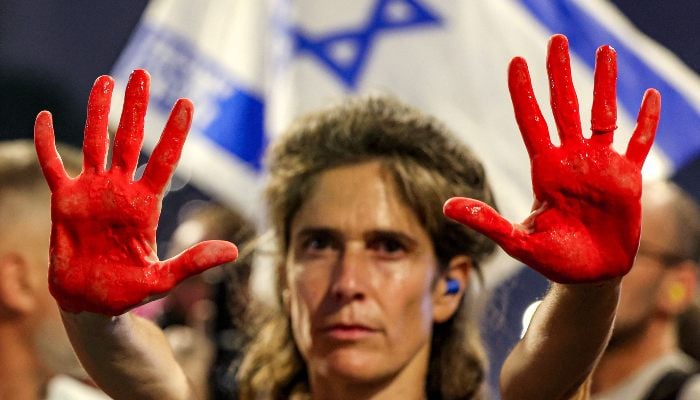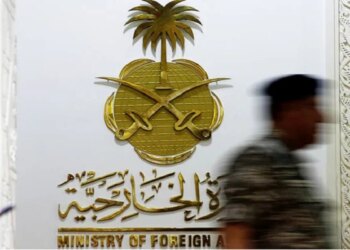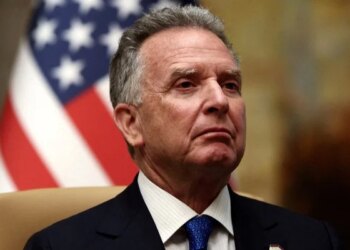Select Language:
A protestor displays her hands painted red to symbolize blood during an anti-government demonstration outside the Israeli Defense Ministry in Tel Aviv on August 2, 2025. — AFP
As Israel’s conflict in Gaza stretches into its 22nd month, it has pitted families against each other and widened existing political and cultural rifts. Families of hostages and peace advocates are urging Prime Minister Benjamin Netanyahu’s administration to pursue a ceasefire with Hamas and secure the release of remaining captives abducted during October 2023 Hamas attacks.
Conversely, right-wing factions within Netanyahu’s cabinet are pushing to capitalize on the situation to annex more Palestinian territories, risking further international backlash. This debate has split the nation and strained personal relationships, weakening national unity when Israel faces its longest ongoing war.
“As the conflict persists, our divisions deepen,” said Emanuel Yitzchak Levi, a 29-year-old poet, educator, and peace supporter from Israel’s religious left, speaking during a peace gathering in Tel Aviv’s Dizengoff Square. “It’s really difficult to maintain friendships or family ties when you see someone supporting actions you believe are crimes against humanity,” he told AFP. “And I imagine it’s just as hard for them to support me if they think I’ve betrayed my country.”
To emphasize this divide, a tall, dark-haired cyclist angrily stopped to shout “traitors” at the protesters and accused some activists of playing into Hamas’s hands.
Dvir Berko, a 36-year-old employee at a local tech startup, paused his scooter ride through downtown Tel Aviv to give a more measured critique of the call for a ceasefire. Berko and others have criticized international organizations for overstating the threat of starvation in Gaza, arguing that Israel should withhold aid until the remaining 49 hostages are released.
“Palestinians are under Hamas’s control. Hamas controls their food. They instigated this war, and in any conflict, casualties are inevitable. No one’s sending flowers to the other side,” Berko explained to AFP. “Those who start wars need to understand what’s coming after.”
Voices in Tel Aviv mirror a growing polarization within Israeli society since Hamas’s October 2023 attack, which resulted in 1,219 deaths, according to independent journalist Meron Rapoport. Rapoport, a former senior editor at the liberal daily Haaretz, noted that political divisions already existed before the latest conflict, with protests against Netanyahu and threats to judicial independence.
Initially, the attack sparked a wave of national solidarity, but as the war has dragged on and Israel’s military actions faced global criticism, opinions on both the right and left have become more entrenched and divergent.
“The moment Hamas launched its attack, there was a sense of unity; most viewed it as a justifiable war,” Rapoport said. “But as the war continues, many have come to see that the core motivations are more political than military.”
A recent survey by the Institute for National Security Studies, between July 24 and 28, reflected this sentiment. It found that Israelis somewhat blame Hamas for delaying a deal to free hostages, with only 24% of Jewish respondents feeling distressed or very distressed about Gaza’s humanitarian crisis, where reports describe a famine and civilians often killed while trying to access food.
Support remains strong for the families of Israeli captives—many of whom accuse Netanyahu of prolonging the conflict for political gain. Mika Almog, a 50-year-old author and peace campaigner with the It’s Time Coalition, said, “In Israel, military service is mandatory. Our children are being sent to die in a bogus, criminal war that seems driven only by politics.”
Recently, 550 former diplomats, military officials, and intelligence leaders jointly urged U.S. President Donald Trump to tell Netanyahu that Israel has achieved its military objectives and now needs to focus on negotiating hostage releases. Former Shin Bet chief Ami Ayalon warned that the conflict, which initially appeared justified, risks compromising Israel’s security and identity once the military phase is over.
Veteran peace advocate Avi Ofer, a 70-year-old biblical archaeologist and kibbutz resident, also expressed deep distress, wearing a yellow ribbon inscribed with the number of days the war has lasted—”667.” As he told AFP, “These are the worst times of my life.” Although acknowledging Hamas’s wartime atrocities, he emphasized that initial military efforts were justified and not genocidal.
Many Israelis, aware of international legal challenges such as possible accusations of genocide at The Hague, are worried about their country’s global reputation and the implications for their children serving in the military.
— AFP







